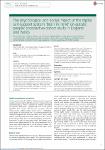The psychological and social impact of the digital self-support system ‘Brain in Hand’ on autistic people: prospective cohort study in England and Wales

Date
2023-05-26Author
Subject
Metadata
Show full item recordAbstract
<jats:sec id="S2056472423000571_sec_a1"> <jats:title>Background</jats:title> <jats:p>Brain in Hand (BIH) is a UK-based digital self-support system for managing anxiety and social functioning.</jats:p> </jats:sec> <jats:sec id="S2056472423000571_sec_a2"> <jats:title>Aims</jats:title> <jats:p>To identify the impact of BIH on the psychological and social functioning of adults with autism.</jats:p> </jats:sec> <jats:sec id="S2056472423000571_sec_a3" sec-type="methods"> <jats:title>Method</jats:title> <jats:p>Adults with diagnosed or suspected DSM-5 (level 1) autism, identified by seven NHS autism services in England and Wales, were recruited for a 12-week prospective mixed-methods cohort study. The primary quantitative outcome measures were the Health of the Nation Outcome Scales for People with Learning Disabilities (HONOS-LD) and the Hospital Anxiety and Depression Scale (HADS). Fisher's exact test explored sociodemographic associations. Paired <jats:italic>t</jats:italic>-test was utilised for pre–post analysis of overall effectiveness of BIH. Multivariable linear regression models, univariable pre–post analysis, Wilcoxon signed-rank test, logistic regression analysis, Bonferroni correction and normative analysis were used to give confidence in changes identified. A thematic analysis of semi-structured exist interviews following Braun and Clarke's six-step process of 10% of participants who completed the study was undertaken.</jats:p> </jats:sec> <jats:sec id="S2056472423000571_sec_a4" sec-type="results"> <jats:title>Results</jats:title> <jats:p>Sixty-six of 99 participants completed the study. There was significant reduction in mean HONOS-LD scores, with 0.65 s.d. decrease in those who used BIH for 12 weeks. Significant positive changes were identified in HONOS-LD subdomains of ‘self-injurious behaviours’, ‘memory and orientation’, ‘communication problems in understanding’, ‘occupation and activities’ and ‘problems with relationship’. A significant reduction in the anxiety, but not depression, component of the HADS scores was identified. Thematic analysis showed high confidence in BIH.</jats:p> </jats:sec> <jats:sec id="S2056472423000571_sec_a5" sec-type="conclusions"> <jats:title>Conclusions</jats:title> <jats:p>BIH improved anxiety and other clinical, social and functioning outcomes of adults with autism.</jats:p> </jats:sec>
Collections
Publisher
Place of Publication
Journal
Volume
Issue
Pagination
Number
Recommended, similar items
The following license files are associated with this item:

